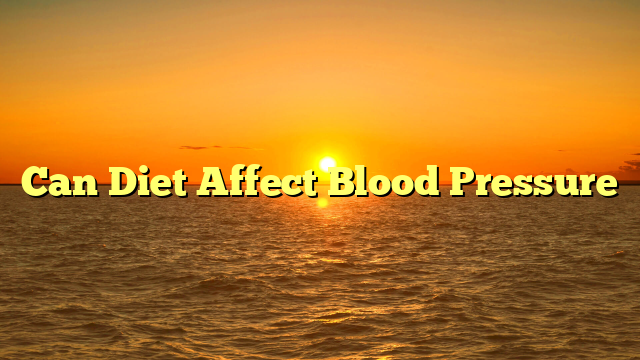Can Diet Affect Blood Pressure
Are you interested in maintaining a healthy lifestyle? Well, here’s some news and information that might pique your curiosity – the impact of diet on blood pressure. We all know that what we eat plays a crucial role in our overall health, but have you ever wondered if it also affects our blood pressure? In this article, we will explore the connection between diet and blood pressure, providing you with valuable insights to help you make informed choices and potentially improve your cardiovascular well-being. So, let’s dive into the fascinating world of how our dietary habits can influence our blood pressure levels.
Introduction
What is blood pressure?
Blood pressure refers to the force at which blood pushes against the walls of your arteries as it flows through your body. It is measured in millimeters of mercury (mmHg) and is typically recorded as two numbers: the systolic pressure over the diastolic pressure. The systolic pressure represents the force when the heart contracts and pumps blood, while the diastolic pressure represents the force when the heart is at rest between beats. A healthy blood pressure reading is generally around 120/80 mmHg.
The importance of maintaining healthy blood pressure
Maintaining healthy blood pressure is crucial for overall well-being. High blood pressure, also known as hypertension, can put strain on the arteries and lead to serious health complications such as heart disease, stroke, and kidney failure. On the other hand, low blood pressure, known as hypotension, can cause symptoms like dizziness, fainting, and fatigue. By actively managing your blood pressure, you can reduce the risk of these adverse health outcomes and promote a healthier life.
The Relationship Between Diet and Blood Pressure
Understanding the impact of diet on blood pressure
Diet plays a significant role in blood pressure regulation. Certain foods and nutrients can either contribute to or help manage high blood pressure. By adopting a balanced and nutritious diet, you can positively influence your blood pressure levels and overall cardiovascular health.
Studies on the correlation between diet and blood pressure
Numerous studies have explored the relationship between diet and blood pressure. These studies consistently highlight the link between unhealthy dietary patterns, such as high sodium and low potassium intake, and elevated blood pressure levels. Conversely, diets rich in fruits, vegetables, whole grains, lean proteins, and low-fat dairy products have been associated with lower blood pressure.
Key nutrients that can affect blood pressure
Several key nutrients have been identified as having a significant impact on blood pressure. These include sodium, potassium, magnesium, and even alcohol consumption. By understanding the role of these nutrients and making informed dietary choices, you can actively manage your blood pressure levels and promote better cardiovascular health.
The DASH Diet
Introduction to the DASH diet
The Dietary Approaches to Stop Hypertension (DASH) diet is an eating plan specifically designed to lower blood pressure. It emphasizes consuming fruits, vegetables, whole grains, lean proteins, and low-fat dairy products while limiting sodium, saturated fats, and added sugars.
The principles and guidelines of the DASH diet
The DASH diet focuses on incorporating nutrient-dense foods that are naturally low in sodium. It recommends increasing fruits and vegetables, opting for lean proteins such as poultry, fish, and legumes, choosing whole grains over refined grains, and consuming low-fat dairy products. Additionally, it suggests reducing sodium intake and avoiding foods high in saturated fats and added sugars.
Scientific evidence supporting the effectiveness of the DASH diet
Numerous studies have provided evidence supporting the effectiveness of the DASH diet in reducing blood pressure. These studies have consistently shown that following the DASH eating plan leads to significant reductions in blood pressure, both in individuals with hypertension and those with normal blood pressure. The DASH diet’s emphasis on a balanced and heart-healthy approach to eating makes it a valuable tool for managing blood pressure.

Sodium and Blood Pressure
The connection between sodium intake and blood pressure
Sodium is a mineral found in many foods. When consumed in excess, sodium can lead to fluid retention, which increases blood volume, thereby raising blood pressure. High sodium intake is commonly associated with hypertension and its related health risks.
Recommended daily sodium intake
The American Heart Association recommends limiting daily sodium intake to no more than 2,300 milligrams (mg), equivalent to about one teaspoon of salt. For ideal blood pressure control, individuals with hypertension or at risk of developing high blood pressure should aim for even lower sodium intake, ideally less than 1,500 mg per day.
Tips for reducing sodium in your diet
Reducing sodium intake can be achieved by making simple changes to your diet. Some helpful tips include reading food labels for sodium content, opting for fresh or minimally processed foods over packaged items, seasoning meals with herbs and spices instead of salt, and avoiding the addition of table salt during cooking or at the table. These small adjustments can make a significant difference in managing blood pressure.
Potassium and Blood Pressure
The role of potassium in maintaining healthy blood pressure
Potassium is an essential mineral that helps regulate fluid balance and counteract the effects of sodium on blood pressure. Adequate potassium intake helps relax blood vessel walls and promotes the excretion of excess sodium through urine, thereby lowering blood pressure.
Foods rich in potassium
Foods that are rich in potassium include bananas, oranges, tomatoes, spinach, sweet potatoes, and beans. Incorporating these nutrient-dense foods into your diet can help increase your potassium intake and support healthy blood pressure management.
How to incorporate potassium-rich foods into your diet
In order to incorporate potassium-rich foods into your diet, you can try adding sliced bananas or berries to your breakfast cereal, enjoying a side of steamed spinach or roasted sweet potatoes with your main meals, and snacking on potassium-rich fruits or vegetables throughout the day. Additionally, swapping out high-sodium processed snacks for healthier alternatives, like unsalted nuts or seeds, can further contribute to a balanced diet for blood pressure management.
Magnesium and Blood Pressure
The impact of magnesium on blood pressure
Magnesium is a vital mineral that plays a crucial role in blood pressure regulation. It helps relax blood vessels, which in turn reduces resistance and allows for better blood flow, leading to healthy blood pressure levels.
Food sources of magnesium
Foods rich in magnesium include dark leafy greens, nuts and seeds, whole grains, fish, and legumes. By incorporating these magnesium-rich foods into your regular diet, you can increase your intake and support blood pressure management.
Supplements and magnesium intake for blood pressure management
While obtaining magnesium from dietary sources is ideal, some individuals may require supplementation to meet their magnesium needs. Before considering supplements, it is important to consult a healthcare professional who can guide you on the appropriate dosage and potential interactions with any medications you may be taking. Ideally, focusing on a balanced diet and including magnesium-rich foods should be the first-line approach to support blood pressure management.
Alcohol and Blood Pressure
The effects of alcohol on blood pressure
While moderate alcohol consumption may have some potential health benefits, excessive alcohol consumption can have detrimental effects on blood pressure. Heavy alcohol intake can elevate blood pressure, contribute to weight gain, and increase the risk of various cardiovascular conditions.
Recommended alcohol consumption for maintaining healthy blood pressure
The American Heart Association suggests moderate alcohol consumption, which is defined as up to one drink per day for women and up to two drinks per day for men. However, individuals with high blood pressure or other health concerns should consult with their healthcare provider before consuming any alcohol.
Risks associated with excessive alcohol intake
Excessive alcohol intake not only contributes to high blood pressure but also increases the risk of heart-related problems, liver disease, and certain types of cancer. It is crucial to practice moderation and be aware of the potential risks associated with excessive alcohol consumption.
Weight Management and Blood Pressure
The link between weight and blood pressure
Maintaining a healthy weight is essential for managing blood pressure. Excess body weight, especially when concentrated around the waist, increases the risk of developing hypertension and other cardiovascular diseases.
The effects of obesity on blood pressure
Obesity puts additional strain on the heart and blood vessels, leading to increased blood pressure. Losing weight, even a modest amount, can significantly lower blood pressure and reduce the risk of developing hypertension.
Diet and lifestyle tips for weight management and blood pressure control
Achieving and maintaining a healthy weight involves adopting a balanced diet and engaging in regular physical activity. It is important to focus on calorie control, portion sizes, and incorporating whole foods into your diet. Additionally, being physically active for at least 150 minutes per week and practicing stress management techniques can further support weight management and blood pressure control.
Other Dietary Factors
Sugar and blood pressure
While more research is needed to fully understand the relationship between sugar consumption and blood pressure, high sugar intake has been associated with an increased risk of hypertension. Limiting added sugars, such as those found in sugary beverages, sweets, and processed foods, can contribute to better blood pressure management.
Caffeine and blood pressure
Caffeine can temporarily raise blood pressure, but the effect is typically small and temporary. For most individuals, moderate caffeine consumption is unlikely to have a significant impact on blood pressure. However, if you are sensitive to caffeine or have hypertension, it may be beneficial to limit your intake or opt for decaffeinated options.
Fiber and blood pressure
A high-fiber diet, particularly one rich in fruits, vegetables, whole grains, and legumes, has been associated with lower blood pressure levels. Fiber helps reduce cholesterol levels, improves blood vessel health, and promotes healthy digestion. Including fiber-rich foods in your diet can contribute to better blood pressure control.
Conclusion
The importance of a healthy diet for maintaining optimal blood pressure
Maintaining a healthy diet is crucial for managing blood pressure and promoting overall cardiovascular health. By understanding the impact of various nutrients and making informed dietary choices, you can actively take control of your blood pressure levels. Incorporating nutrient-dense foods, reducing sodium intake, and paying attention to overall weight management can all contribute to a healthier blood pressure and a healthier you. Remember, small changes to your diet and lifestyle can make a big difference in achieving and maintaining optimal blood pressure levels.








